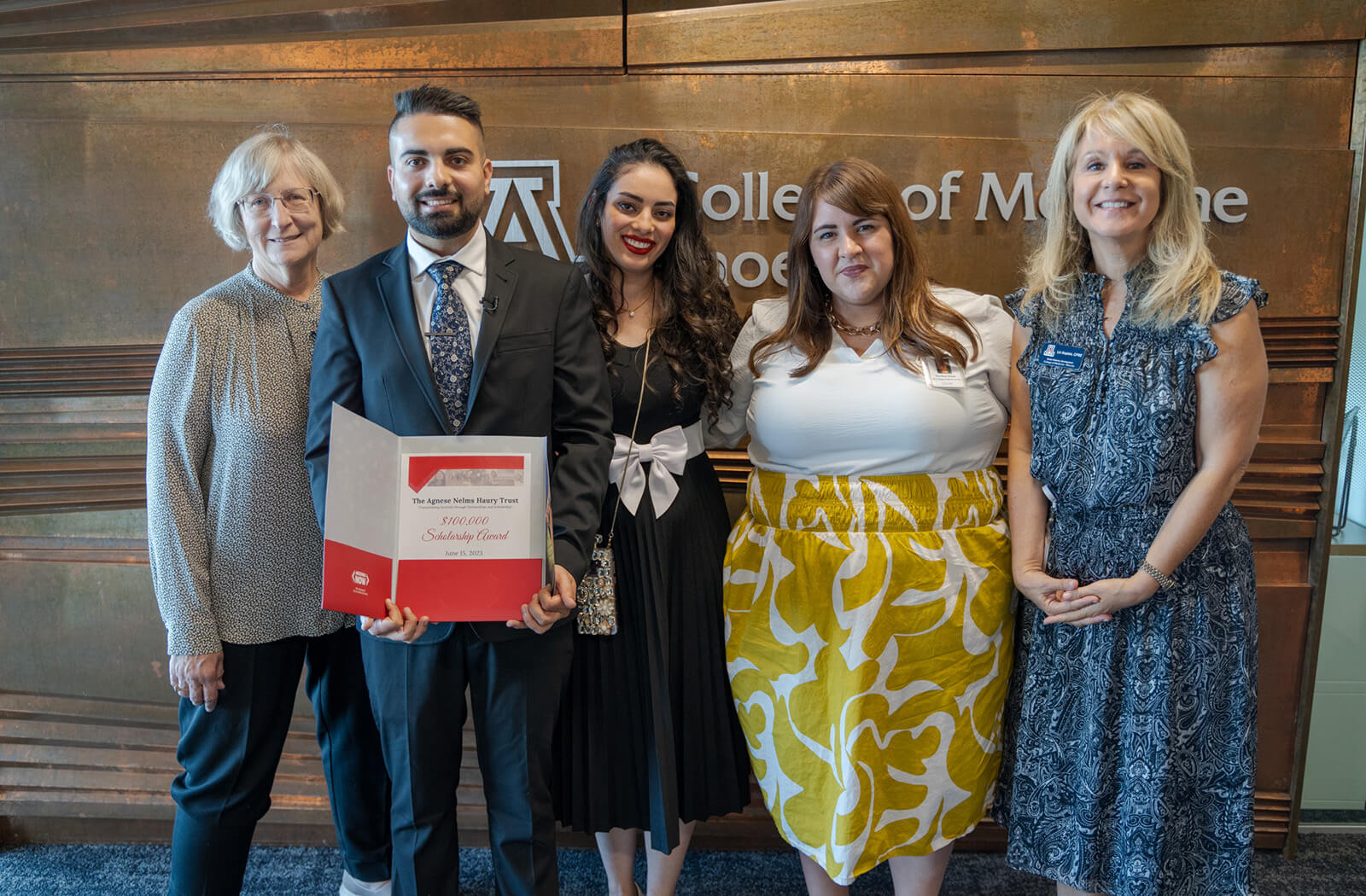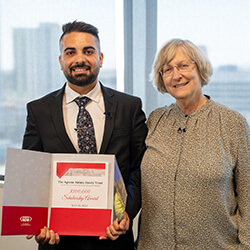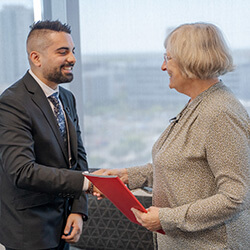
Haury Trust Awards $100,000 to Pathway Scholars Student

Muhaiman Alabdly, an incoming student in the University of Arizona College of Medicine – Phoenix’s Pathway Scholars Program, was unanimously chosen as the recipient of the Agnese Nelms Haury Charitable Trust scholarship.
The Haury Charitable Trust’s board of trustees chose to donate $100,000 to the U of A College of Medicine – Phoenix’s Pathway Scholars Program. The gift will be distributed in five annual increments of $20,000 and will follow Alabdly all the way to his graduation from medical school.

“He represents an underserved group in the field of medicine, being a refugee, someone who’s entering the field as an older student and someone with a disability,” Grier said. “He has all of the intellect, promise, drive, initiative and leadership skills to make a real contribution to his field.”
During her life, Agnese Nelms Haury supported a range of causes that included social and environmental justice. In her philanthropy, Mrs. Haury was passionate about investing in innovative scholarship.
Although Alabdly witnessed medical disparity and inequality as a child in Iraq, his inspiration to pursue medical school stemmed from a personal tragedy.
In 2004, when he was 12 years old, Alabdly and his grandfather were outside their apartment when a car bomb exploded. Alabdly’s grandfather was struck by shrapnel and died within a few hours.
After witnessing such a traumatic event, Alabdly experienced anxiety because he was powerless to help his grandfather. However, he learned to ease that anxiety by helping other people.
“My grandfather always talked to me about the importance of education,” Alabdly said. “Growing up in such circumstances, the best gift you can give to your community is saving another person’s life.”
Alabdly’s medical school studies began in Iraq, but they were unfortunately interrupted when he and his family had to flee the country. They came to the United States as refugees. This forced them to start their lives over from scratch, including his pursuit of medicine.
“At that point, our survival was threatened, so although medical school was something I wanted so badly, we chose survival at that moment,” Alabdly said. “I got involved with medical disciplines with volunteering and started educating myself about the Phoenix community.”
Eventually, Alabdly gained United States citizenship. He credits his family as his biggest supporters for the sacrifices they have made, saying that without them, he would not be where he is today.
“My message on life is to help the underserved who were like me,” Alabdly said. “My family started from that point all over again just to help us all get to where we want to be.”

“Just like how I learned to thrive from my previous experiences, I wanted to apply what I learned on my current experience,” Alabdly said. “I started studying for the MCAT through audio, and then I made it to medical school.”
A committee comprised of faculty, staff and a previous Pathway Scholars student selected Alabdly because he demonstrated outstanding leadership strengths and a clear desire to better the future for the next generation of physicians.
Alabdly hopes to become a compassionate and empathetic physician in the future and wants to continue researching.
“In the middle of all the chaos, I found a new love, which is research. I researched my own disease,” Alabdly said. “I joined a couple of disciplines, and I made my own publications, as well as co-authored in some prestigious disciplines.”
About the College
Founded in 2007, the University of Arizona College of Medicine – Phoenix inspires and trains exemplary physicians, scientists and leaders to advance its core missions in education, research, clinical care and service to communities across Arizona. The college’s strength lies in our collaborations and partnerships with clinical affiliates, community organizations and industry sponsors. With our primary affiliate, Banner Health, we are recognized as the premier academic medical center in Phoenix. As an anchor institution of the Phoenix Bioscience Core, the college is home to signature research programs in neurosciences, cardiopulmonary diseases, immunology, informatics and metabolism. These focus areas uniquely position us to drive biomedical research and bolster economic development in the region.
As an urban institution with strong roots in rural and tribal health, the college has graduated more than 1,000 physicians and matriculates 130 students each year. Greater than 60% of matriculating students are from Arizona and many continue training at our GME sponsored residency programs, ultimately pursuing local academic and community-based opportunities. While our traditional four-year program continues to thrive, we will launch our recently approved accelerated three-year medical student curriculum with exclusive focus on primary care. This program is designed to further enhance workforce retention needs across Arizona.
The college has embarked on our strategic plan for 2025 to 2030. Learn more.